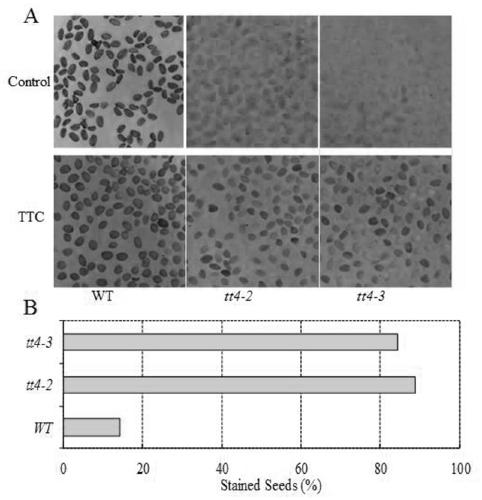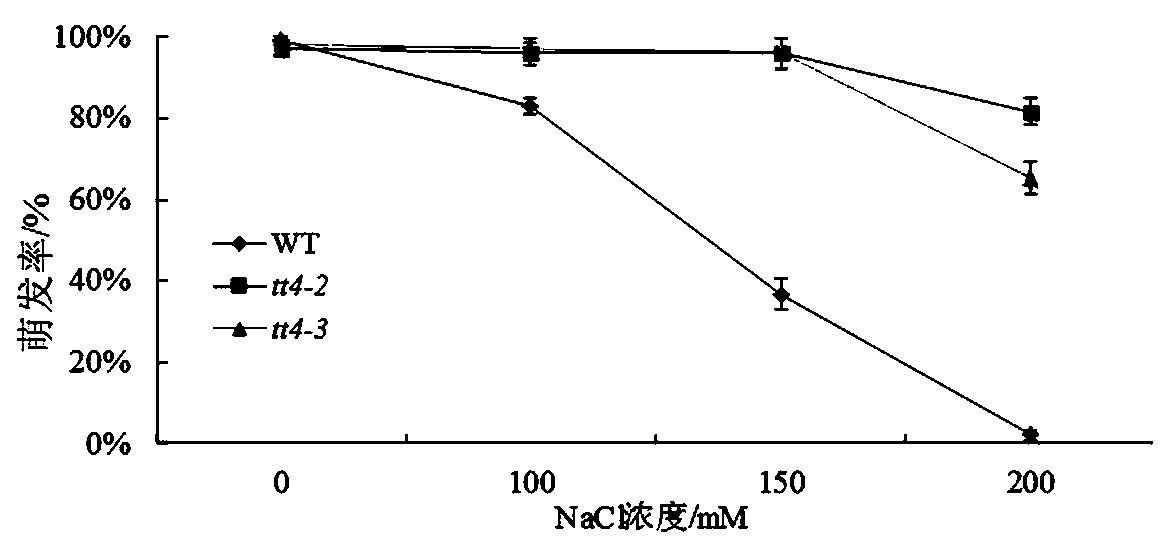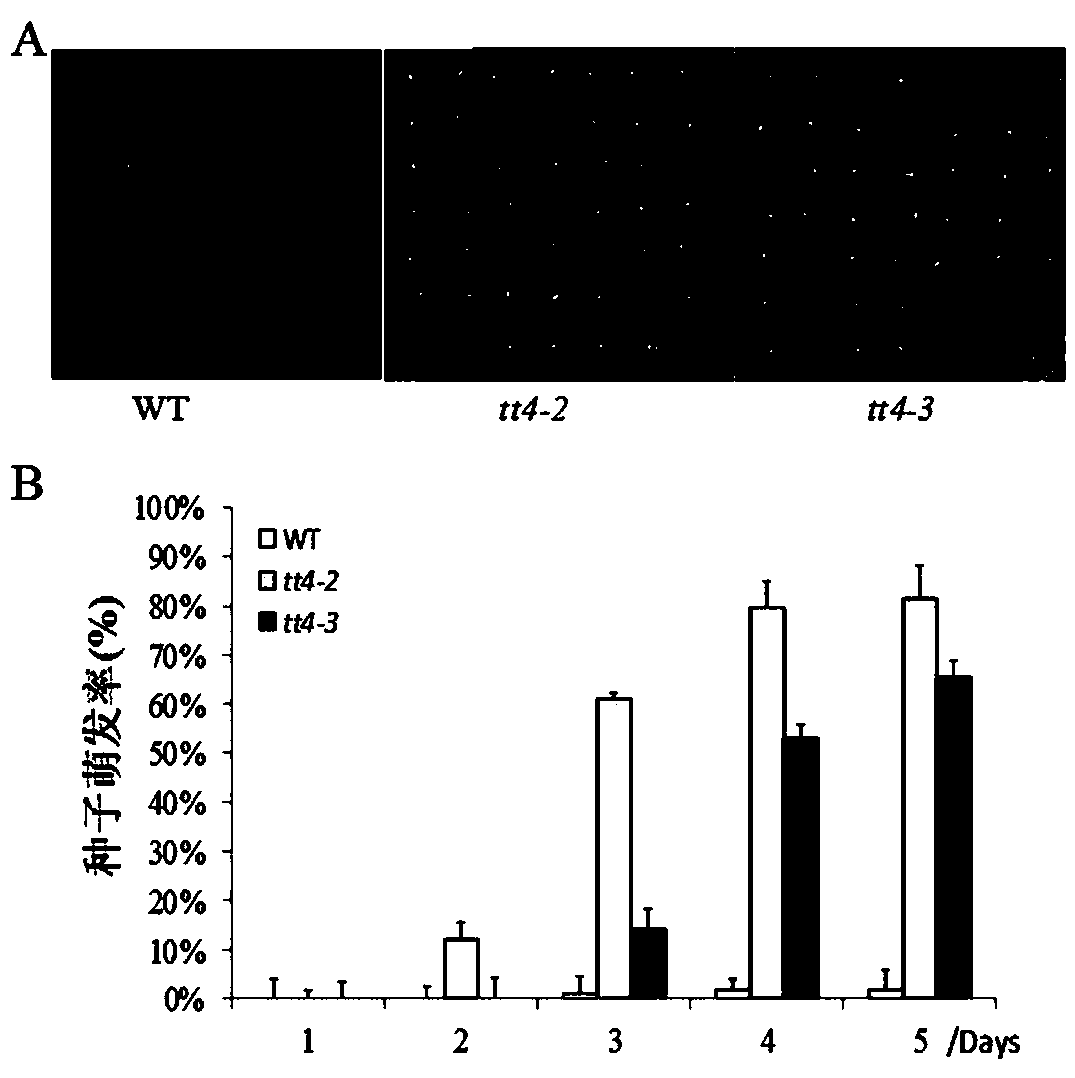New Application of Arabidopsis tt4 Gene in Plant Salt Tolerance
A technology of Arabidopsis and genes, which is applied in the field of genetic engineering applications and can solve problems such as variation
- Summary
- Abstract
- Description
- Claims
- Application Information
AI Technical Summary
Problems solved by technology
Method used
Image
Examples
Embodiment 1
[0017] This embodiment is mainly for TT4 The relationship between gene (At5g13930 gene) and plant seed vigor is briefly explained.
[0018] During the preliminary basic research process, the inventor believes that TT4 The gene (At5g13930 gene) is related to the vigor of plant seeds. Therefore, the inventors used Arabidopsis wild type (WT), tt4-2 and tt4-3 Mutants were taken as an example to verify this conclusion by comparative experiments. The related experimental process is introduced as follows.
[0019] Dried Arabidopsis wild-type (WT), tt4-2 and tt4-3 The mutant seeds were respectively placed in a solution containing triphenyltetrazolium chloride (TTC) at a temperature of 30°C, and dyed in the dark for 48 hours, and the coloring status of the seeds was observed and counted.
[0020] said tt4-2 and tt4-3 Mutants were obtained from the Arabidopsis Resource Center TT4 The gene (At5g13930 gene) was knocked out by gene knockout of three bases and one more base m...
Embodiment 2
[0024] On the basis of Example 1, the inventor thinks TT4 The vigor of the seeds can be improved after gene mutation, and its salt tolerance ability may also be improved, so the inventor has done further experimental verification. The related process is briefly introduced as follows.
[0025] Arabidopsis wild type (WT), tt4-2 and tt4-3 The mutant seeds were sown on MS medium containing 100 mM NaCl, 150 mM NaCl, and 200 mM NaCl respectively, and MS medium without adding other substances was set as a control, and the mass content of MS medium agar was 0.6%.
[0026] said tt4-2 and tt4-3 Mutant sources are the same as in Example 1.
[0027] After the seeds were sown, the cultivation environment was as follows: the light / dark cycle was 8 / 16h, the temperature was 22°C, the dark temperature was 18°C, the relative humidity was 70%, and the light intensity was 90 µmol·m -2 ·s -1 .
[0028] Specific observations were made on the germination process of Arabidopsis thaliana s...
Embodiment 3
[0032] Based on the research result of embodiment 2, the inventor thinks that it is necessary to TT4 The expression of genes in Arabidopsis tissues was further analyzed, and the relevant experimental procedures are briefly introduced as follows.
[0033] right TT4 When analyzing the expression of genes in Arabidopsis tissues, the technical scheme adopted is: TT4 The gene promoter was fused with the coding region of the GUS reporter gene on the pCAMBIA1391 vector to construct the pTT4-pCAMBIA1391 vector, and the transgenic plants transformed with wild-type Arabidopsis thaliana into TT4-GUS were obtained by using the method of Agrobacterium infecting Arabidopsis tidbits, and then right TT4 Gene expression in Arabidopsis tissues was analyzed in detail.
[0034] The specific experimental process is introduced as follows.
[0035] (1) Preparation of pTT4-pCAMBIA1391 vector
[0036] The At5g13930 gene promoter sequence was obtained from the Arabidopsis website (http: / / www.arabi...
PUM
 Login to View More
Login to View More Abstract
Description
Claims
Application Information
 Login to View More
Login to View More - R&D
- Intellectual Property
- Life Sciences
- Materials
- Tech Scout
- Unparalleled Data Quality
- Higher Quality Content
- 60% Fewer Hallucinations
Browse by: Latest US Patents, China's latest patents, Technical Efficacy Thesaurus, Application Domain, Technology Topic, Popular Technical Reports.
© 2025 PatSnap. All rights reserved.Legal|Privacy policy|Modern Slavery Act Transparency Statement|Sitemap|About US| Contact US: help@patsnap.com



